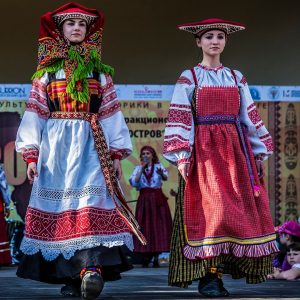Уро́к 4
4.5 Грамма́тика – Past Tense
Грамма́тика
Part I.
Past tense refers to actions or states that happened in the past.
In Unit 2, you learned how to conjugate verbs in the present tense. Before we get into past tense, recall that:
Russian present tense conjugation can translate into English several ways: either present simple, present perfect, present continuous, or present perfect continuous.
For example, the single Russian sentence:
Я рабо́таю.
can be translated for ways in English to mean:
1. I work.
2. I am working.
3. I have worked.
4. I have been working.
NOTE: An English speaker might think of examples 3 and 4 as past tense because the action started in the past. Because the action, or result of the action, often continues or remains true into the present, these are technically present tense verbs. Importantly, if the action is currently still happening, they tend to translate into Russian with the present tense!
Наприме́р:
Я живу́ в О́стине.
I live in Austin.
Я живу́ в О́стине уже́ 15 лет.
I have lived / have been living in Austin for 15 years.
Forming the past tense in Russian is relatively simple compared to present tense patterns discussed in Unit 2. With present tense you had to make sure the verb always showed agreement with the subject in person and number (first person singular, third person plural, etc). With past tense, you ONLY need the subject’s GENDER and NUMBER (singular or plural).
The past tense forms for ‘рабо́тать’ are:
| он рабо́тал | ‘worked’ / ‘was working’ (masculine, singular) |
| она́ рабо́тала | ‘worked’ / ‘was working’ (feminine, singular) |
| оно́ рабо́тало | ‘worked’ / ‘was working’ (neuter, singular) |
| они́ рабо́тали | ‘worked’ / ‘was working’ (plural) |
Part II.
The past tense is easy to derive from the infinitive.
For most Russian verbs, to make past tense forms, drop the infinitive -ть ending and add one of four possible endings:
| -л | for all masculine singular subjects |
| -ла | for all feminine singular subjects |
| -ло | for all neuter singular subjects |
| -ли | for all plural subjects |
Read the following examples:
 |
Я рабо́тала в ба́нке.
‘I worked / used to work at a bank.’ |
 |
Когда́ ты жил в Росси́и?
‘When did you live in Russia?’ |
 |
Она (Оля) отдыха́ла до́ма.
‘She rested at home.’ |
 |
Она́ (ко́шка) спала́ на полу́.
‘It (the cat) was sleeping on the floor.’ |
 |
Мы гуля́ли.
‘We took a stroll.’ |
 |
Вы говори́ли по-неме́цки в Герма́нии?
‘Did you speak German in Germany?’ |

